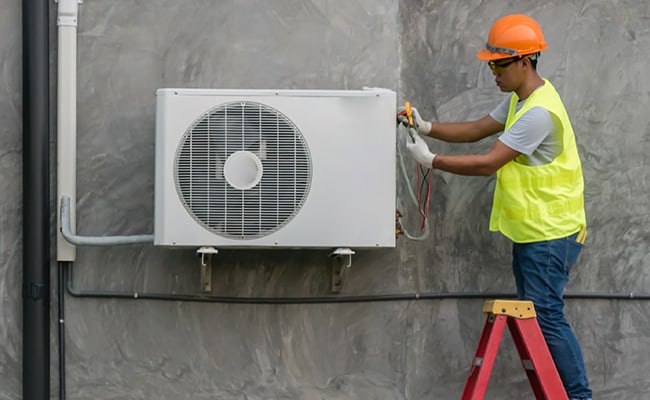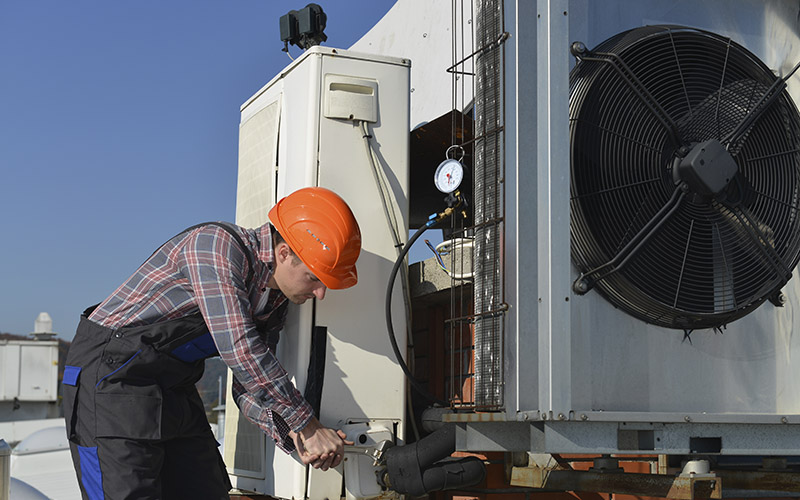Key Factors to Consider Before Your furnace replacement
Key Factors to Consider Before Your furnace replacement
Blog Article
Selecting Between a Warmth Pump and Heater: Trick Considerations for Your A/c Demands
When evaluating heating choices for a/c requires, the decision between a warm pump and a heating system can be complex. Each system uses unique advantages customized to specific environments and energy efficiency goals. Recognizing these differences is necessary for making an informed selection. Secret factors such as setup prices and ecological effect even more complicate the choice procedure. Which choice really straightens with one's comfort and sustainability preferences? The complying with areas will explore these considerations in detail.
Understanding Warm Pumps: How They Function and Their Benefits
While lots of property owners consider various home heating options, recognizing how warmth pumps feature and their advantages can significantly affect their choice. Heatpump operate by transferring warm as opposed to producing it. In the winter season, they draw out heat from the outdoors air or ground and move it inside your home, while in the summertime, they reverse this process, cooling down the home by getting rid of warm outside. This twin performance makes them versatile for year-round environment control.One of the primary advantages of heatpump is their energy efficiency. They utilize considerably much less electricity compared to traditional heating unit, possibly resulting in reduced energy bills (heat pump installation ooltewah tn). Furthermore, warmth pumps have a smaller carbon footprint, making them an eco friendly option. They additionally call for much less upkeep than conventional systems, adding to long-term price financial savings. Overall, recognizing the technicians and advantages of heatpump can aid property owners make educated decisions concerning their heating and cooling needs
Checking Out Furnaces: Kinds, Procedure, and Advantages
Heaters are available in numerous kinds, consisting of gas, electrical, and oil models, each with distinct functional mechanisms. Recognizing these distinctions is necessary, as they impact performance and heating efficiency. Furthermore, heaters supply numerous advantages, such as regular warmth result and integrity in cooler environments.
Kinds of Heaters
Heater can vary significantly in design and operation, with furnaces being a popular selection amongst house owners. There are several sorts of heaters, each making use of various gas sources and modern technologies. Gas heating systems prevail, leveraging gas to generate heat efficiently. Electric heaters, on the various other hand, make use of electric resistance to produce warmth, typically favored for their uncomplicated installment. Oil heating systems, while less common, are reliable in areas with restricted gas gain access to (heat pump replacement ooltewah tn). Additionally, condensing furnaces maximize power performance by recycling and catching exhaust gases. Each kind operates via a system of warmth exchangers and ductwork to disperse cozy air throughout a home. Understanding the differences in between these heating system kinds is crucial for notified HVAC choices
Benefits of Furnaces
For house owners seeking dependable heat throughout cold months, the benefits of heaters are considerable. Furnaces supply regular home heating, making sure even temperature levels throughout the home. They are specifically effective in extreme chilly, usually outshining warm pumps in cold conditions. Numerous types, consisting of gas, electric, and oil furnaces, provide versatility to meet varied demands and preferences.Furnaces additionally have a tendency to have reduced initial installation costs compared to heatpump, making them an extra accessible option for lots of. Their durable style adds to a much longer life-span, with several systems lasting over 15 years with correct upkeep. Furthermore, modern furnaces are commonly geared up with sophisticated innovation for enhanced efficiency, which can bring about minimized energy bills. In general, heating systems stay a trustworthy option for efficient home heating.

Energy Performance: Comparing Warmth Pumps and Furnaces
When comparing power effectiveness in between heatpump and heating systems, the Seasonal Power Performance Proportion (SEER) plays a vital duty in determining performance. In addition, a functional expense evaluation discloses the lasting monetary effects of each system. Recognizing these variables can assist homeowners in making informed choices concerning their home heating solutions.
Seasonal Power Performance Ratio
Energy effectiveness plays a necessary function in the decision-making process in between warm pumps and furnaces, especially when thinking about the Seasonal Energy Performance Proportion (SEER) This metric measures the cooling performance of warmth pumps over an entire air conditioning season, giving a standard method to assess efficiency. Higher SEER rankings suggest greater power effectiveness, translating to reduced energy intake and minimized utility bills. On the other hand, heating systems are usually evaluated making use of the Annual Fuel Application Efficiency (AFUE) ranking, which mirrors heating performance. When comparing these 2 systems, homeowners must prioritize SEER rankings for heat pumps, as they straight effect total energy financial savings and environmental sustainability. A comprehensive understanding of SEER can especially influence the long-lasting contentment and cost-effectiveness of the picked heating and cooling solution.
Operational Cost Evaluation
Comprehending the operational expenses connected with warmth pumps and heaters is vital for property owners assessing their options. Warmth pumps generally offer higher energy efficiency, transforming electric power right into warmth with marginal waste. This results in lower monthly utility expenses, specifically in moderate environments. On the other hand, traditional heaters, particularly gas versions, might have reduced in advance prices however can incur greater operational expenses in time because of fuel costs and effectiveness ratings.Moreover, heatpump can function as both heating and cooling systems, possibly reducing the requirement for separate HVAC systems. While preliminary investments for heat pumps might be higher, their long-term savings in power effectiveness can make them a much more cost-effective option for many households. Careful analysis of regional power prices is vital to figure out the very best option.
Setup Expenses: What to Expect for each and every Home Heating System
Installment expenses for heating unit can vary substantially between warm pumps and heaters, influencing home owners' choices. Heatpump typically have higher upfront installment costs, normally ranging from $3,500 to $8,000, depending upon the device dimension and complexity of setup. This includes the exterior unit, interior handling system, and necessary ductwork modifications. Conversely, heating systems often tend to have reduced first costs, balancing between $2,500 and $6,000, which can be appealing for budget-conscious home owners. Installation expenditures can boost if comprehensive ductwork is required.Moreover, the option of fuel kind for heating systems-- all-natural internet gas, lp, or electric-- can additionally impact installment costs. While heat pumps supply energy performance, their first investment might discourage some buyers. Eventually, examining installation costs together with long-lasting savings and efficiency will certainly help home owners in making educated choices regarding their heating unit.
Climate Factors To Consider: Which System Performs Better in Your Area
Just how do climate conditions influence the efficiency of heater? The efficiency of heatpump and furnaces can differ significantly relying on the local environment. In modest this page environments, heatpump stand out by effectively moving warm from the outdoors air, making them an energy-saving option. Their effectiveness diminishes in extremely cool temperature levels, where they may have a hard time to draw out adequate warm. Alternatively, heaters, especially gas versions, give regular and dependable heat no matter outside problems, making them better in colder regions.In areas that experience milder winters, warm pumps can operate successfully year-round, giving both heating & cooling. In comparison, areas with extreme winters months usually gain from the effectiveness of heating systems. Inevitably, understanding the neighborhood climate is vital when determining in between a warm pump and a heating system, as it directly influences their functional effectiveness and overall performance.
Maintenance Demands: Long-Term Care for Warmth Pumps vs. Furnaces
While both warmth pumps and heaters call for regular maintenance to guarantee peak efficiency, their particular requirements and treatment routines differ considerably. Heating systems normally require less frequent focus, with annual evaluations being adequate to look for gas leaks, clean filters, and analyze total functionality. Their less complex layout usually permits straightforward repairs.In contrast, heatpump demand semiannual maintenance due to their double role in heating and air conditioning. This includes cleansing coils, checking refrigerant levels, and making sure that both the interior and exterior units function at their ideal. Furthermore, heatpump maintenance typically involves more intricate parts, making expert maintenance essential.Neglecting upkeep can result in reduced performance and boosted energy prices for both systems. Inevitably, homeowners should take into consideration these long-term care needs when picking between a heatpump and a furnace, as aggressive upkeep can extend the lifespan and efficiency of either system significantly.
Environmental Influence: Selecting a Sustainable Heating Choice
The environmental impact of heater is a vital evaluation for property owners seeking lasting choices. Heat pumps are usually much more energy-efficient than conventional heating systems, as they move heat instead of create it, greatly minimizing carbon emissions. By utilizing sustainable power resources, such as geothermal or air-source heat pumps, house owners can further reduce their eco-friendly footprint.On the various other hand, gas furnaces produce greenhouse gases and add to air contamination, though they often provide higher heat outcome. Improvements in innovation have actually led to the advancement of high-efficiency furnaces that decrease emissions.Ultimately, picking a home heating system involves weighing performance versus ecological impact. Property owners are urged to mirror on neighborhood power sources and motivations for renewable systems, guaranteeing an option that lines up with both individual comfort and environmental responsibility. The choice impacts not just prompt comfort yet additionally lasting sustainability and ecological wellness.
Regularly Asked Questions
Exactly How Long Do Warm Pumps and Furnaces Commonly Last?
The lifespan of heatpump normally ranges from 15 to twenty years, while heating systems can last between 15 to three decades. Normal maintenance considerably influences their durability and effectiveness in offering heating services.
Can I Utilize a Heatpump in Exceptionally Cold Climates?
Heat pumps can operate in extremely chilly environments, but their performance reduces as temperatures decrease. In such conditions, supplemental home heating resources might be needed to keep comfortable indoor temperatures and guarantee peak performance.

What Is the Noise Degree of Heat Pumps Versus Furnaces?
The sound levels of heat pumps and heaters differ substantially. Generally, warmth pumps operate even more silently than conventional heating systems, making see here them more suitable for those conscious seem, while heating systems may create louder operational sounds during home heating cycles.
Are Heat Pumps Suitable for Both Cooling And Heating?
Heatpump are certainly suitable for both heating & cooling (heat pump replacement ooltewah tn). They work by transferring warm, providing efficient temperature level control year-round, making them a versatile option for homeowners looking for an all-in-one heating and cooling option
What Dimension Furnace Do I Required for My Home?
Determining the proper size heater for a home calls for assessing variables such as square video, insulation top quality, regional climate, and the home's layout. Consulting a professional can assure an exact analysis and optimal comfort. Warm pumps commonly supply higher energy performance, converting electrical power into warm with marginal waste. In modest environments, warm pumps stand out by efficiently moving warm from the outdoors air, making them an energy-saving alternative. Alternatively, furnaces, particularly gas versions, give regular and dependable warmth no matter of outdoor conditions, making them preferable in colder regions.In locations that experience milder winters, heat pumps can run effectively year-round, supplying both heating and cooling. Warmth pumps are normally a lot more energy-efficient than standard furnaces, as they move heat rather than generate it, substantially decreasing carbon emissions. By utilizing renewable energy resources, such as air-source or geothermal warm pumps, home owners can additionally decrease their ecological footprint.On the various other hand, natural gas heating systems discharge greenhouse gases and add to air pollution, though they often supply higher heat outcome.
Report this page